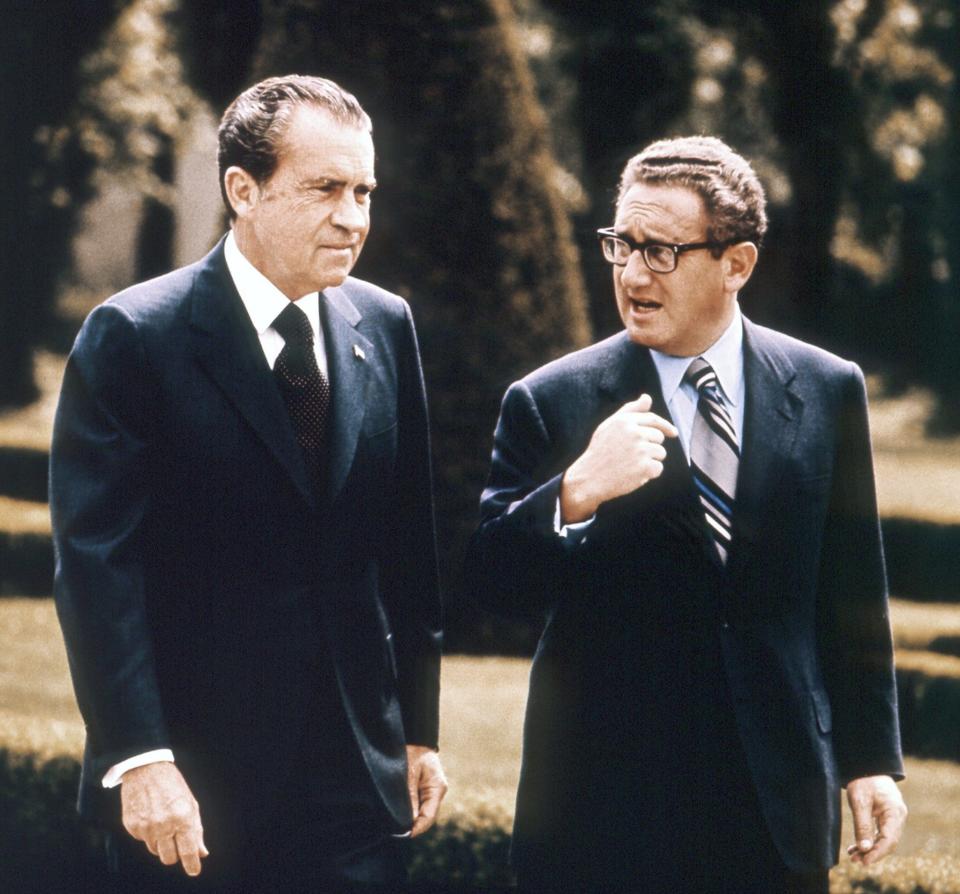Kissinger memorial draws angry protesters of Israel war. Vietnam War families can relate.
- Oops!Something went wrong.Please try again later.
Henry Kissinger’s passing has become a flashpoint in protests about the Israel-Hamas war, as evidenced by the presence of angry protesters outside a private memorial for him last week.
A different grievance, the POW/MIA community, one of Kissinger’s earliest diplomatic victims, shares equal vitriol for him.
How many were killed, left missing or displaced by his choices as a global leader? His early years in service for Richard Nixon, who together secretly manipulated and extended the Vietnam War, were some of the deadliest.
An MIA family advocate and researcher, I am also the proud daughter of a veteran who piloted secret reconnaissance missions over the Ho Chi Minh Trail from September 1972 through April 1973. These missions identified supply lines before and after the Paris Peace Accords that Kissinger negotiated.
I research Nixon and Kissinger’s late war strategy to understand the fate of the Baron 52, a reconnaissance mission shot down on Feb. 5, 1973, the week between the signing of the accords and the return of U.S. prisoners of war in Operation Homecoming. Fortunately, my father was not flying that night.
U.S. reconnaissance plane shot down at inconvenient time for Nixon
Swift closure of the Baron 52 case left discomfort for many involved, like my father, who did not believe proper accounting was done.
A Senate POW/MIA Affairs Committee in the early 1990s investigated the incident ahead of normalizing trade relations with Vietnam. Leaders and experts questioned the efforts by the Air Force, CIA, Defense Department, Defense Intelligence Agency and others to determine the MIA crew’s fate.
Yet, a nearly empty grave, holding only tooth and bone fragments recovered from the crash site, in Arlington National Cemetery represents all eight men since 1995.
Vietnam War legacy: I am Henry Kissinger's human 'legacy of war' – a trauma passed among generations
Robert Shields, deputy assistant secretary of Defense for POW/MIA affairs in 1973 who ran the plan for Operation Homecoming, still questions the handling of Baron 52. In a podcast that I conducted with a researcher and the family of an MIA service member, Shields confirmed that he was informed when Baron 52 became a search and rescue mission and immediately notified Kissinger about the shootdown because of the sensitive timing so close to the return of U.S. prisoners of war.
MIA status quickly changed to killed in action and bodies not recovered for four intelligence officers, despite reports stating zero visual evidence of their whereabouts in or around the wreckage. No additional search was authorized until 1993.
Nixon and Kissinger sought admiration for Operation Homecoming a half-century ago, but a new MIA incident would have diffused that critical victory before Watergate became public knowledge.
Opinion alerts: Get columns from your favorite columnists + expert analysis on top issues, delivered straight to your device through the USA TODAY app. Don't have the app? Download it for free from your app store.
In their political ambitions, Nixon and Kissinger sacrificed lives
Their manipulation and extension of the war began even before Nixon became commander in chief. President Lyndon Johnson intended to end the war before the 1968 presidential election. Nixon knew a peace agreement was key to winning the presidency, so his team circumvented Johnson’s negotiations.
Nixon’s peace pledge in the 1968 campaign resonated with Americans after the Vietnam War’s deadliest year. Six months into his presidency, Nixon announced he would begin withdrawal of ground troops while he secretly supported Kissinger expanding the intensity of bombing campaigns on the Ho Chi Minh Trail in neighboring Laos and Cambodia.

Nixon’s presidential ambition and Kissinger’s aspiration to control peace negotiations extended the war for five years, triggering the draft and costing the lives of more than 21,000 additional U.S. troops.
Nearly 60,000 U.S. service members died and 150,000 were wounded in the Vietnam War. That pales in comparison with the millions of Vietnamese, Laotian and Cambodian soldiers and civilians killed or wounded.
I dropped cluster bombs on Laos. Ukraine shouldn't want this nightmare.
Nixon and Kissinger lavished the success of Operation Homecoming with little regard for the remaining MIAs. The transcript of Kissinger’s final peace negotiation in Paris in December 1973 reveals that the phrase “missing in action” was mentioned just a couple of times. MIAs remained a low priority for Kissinger despite becoming secretary of State and a Nobel Peace Prize winner.
Despite the promise of a full accounting, five decades later 1,578 Vietnam War service members remain missing, according to the Defense POW/MIA Accounting Agency. Do MIA families feel they are still a priority? No, they feel abandoned.
Despite his passing, those of us still seeking answers about POW/MIAs must wait longer for Kissinger’s papers at Yale to be released. Some have a five-year waiting period, but others are restricted until 25 years after his death. That timeline will prevent many MIA family members from living long enough to see what is released.
Evidence of Nixon and Kissinger's devastating choices are still apparent across Laos, Cambodia and Vietnam. Areas of Laos remain littered with unexploded ordnance. Dormant dangers riddle the breathtaking landscape.
From 1964-73, the United States dropped 2.5 million tons of ordnance on Laos during 580,000 bombing sorties, equal to a planeload of bombs every eight minutes, 24 hours a day. Of the more than 270 million cluster bombs, a third did not explode on impact. Only about 10% has been cleared since the last bomb was dropped in 1973.

For 20 years Legacies of War, where I was a board member, has managed congressional funds to clear unexploded ordnance and provide survivor assistance in Laos, Cambodia and Vietnam. In 2022, U.S. funding for all three countries totaled nearly $75 million.
Will we finally hold Henry Kissinger accountable for his actions now that he and his co-conspirator, President Richard Nixon, are no longer here?
Heather Moore Atherton, communication professional and daughter of a Vietnam War veteran, is a former member of the Board of Directors of Legacies of War.
You can read diverse opinions from our Board of Contributors and other writers on the Opinion front page, on Twitter @usatodayopinion and in our daily Opinion newsletter.
This article originally appeared on USA TODAY: Anti-Israel protest disrupts Kissinger funeral service. We can relate

